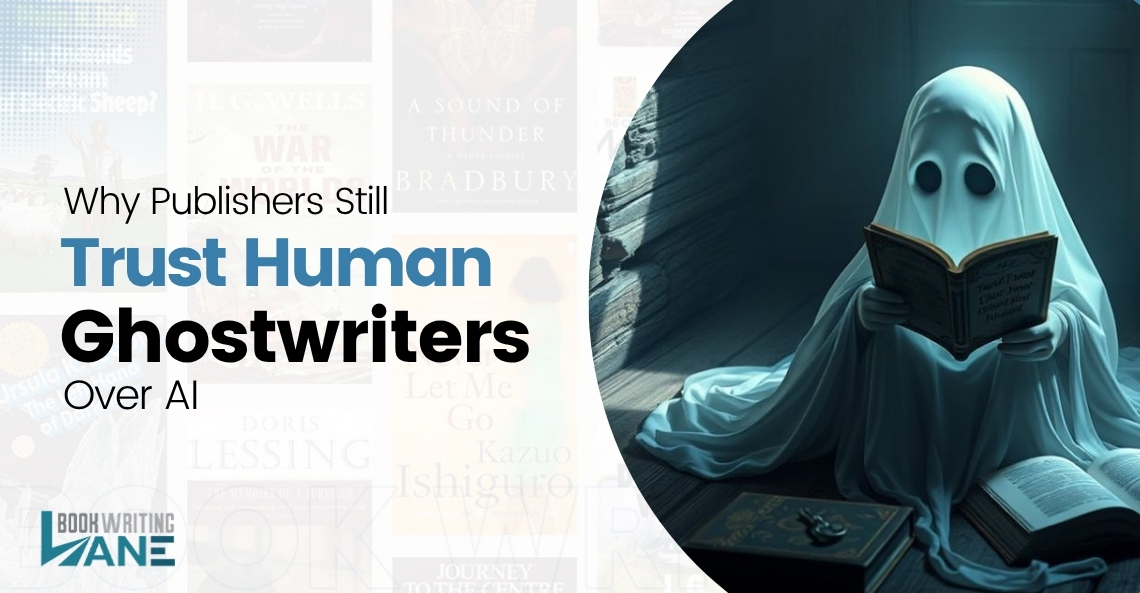You’ve seen
it everywhere. AI writing books, blogs, and even love letters. But here’s the
twist: major publishers still choose human ghostwriters, not machines. If AI
can write, edit, and even rhyme on command, why do the biggest names in
publishing still prefer people? The answer goes beyond grammar and speed.
Ghostwriting is about human connection, creativity, and understanding
emotion. Now, tech does keep evolving.
However, the art of storytelling still depends on the human touch. According to
a 2024 Statista report, AI tools create over 25% of online content. Yet 82% of
publishers still favor human-led writing projects.
A Quick Look Back:
Ghostwriting in the Publishing Industry
Ghostwriting
isn’t new. It’s been part of the publishing world for decades—long before AI or
online content took over. In fact, it quietly shaped some of history’s most
powerful voices. From presidential speeches to celebrity memoirs, ghostwriters
have always been the ones turning ideas into polished words. Funny thing is,
you’ve probably read hundreds of their works without ever knowing it.
Take
political leaders, for example. Many of those inspiring autobiographies on
bookstore shelves? Written by ghostwriters. And that’s not a secret within the
industry—it’s a badge of trust. As the publishing scene evolved, ghostwriting
in the publishing industry became less of a behind-the-scenes favor and more of
a professional art form.
These writers
are chameleons. They adapt, research, and write in a way that makes readers
feel as though the author is speaking directly to them. As publisher David
Kudler puts it, “Good ghostwriting is
invisible—you hear the author’s voice, not the writer’s.”
That
invisibility is what makes them invaluable. Professional ghostwriters don’t just type words. But they translate
emotions, experiences, and personalities. They make stories that feel real.
And
publishers? They have relied on that skill for generations. Because it’s not
about speed. But it’s about sincerity.
Now, tech is
rewriting the rules of storytelling. Still, ghostwriting services continue to
grow. Why so? Because publishers know that behind every bestseller, there’s a
writer.
One who
listened, understood, and brought someone else’s story to life. And an
algorithm can't replicate that.
How
AI Changed the Game
Let's travel
a few years back. The idea of AI writing anything? Back then, that sounded like
science fiction. But now? It’s everywhere.
From school
essays to business blogs. Basically, AI tools like ChatGPT and Jasper have
slipped into the creative process without knocking. By early 2025, OpenAI had
over 180 million monthly users. hence, proving just how fast this shift
happened.
AI is
impressive, no doubt.
●
It can
draft emails in seconds
●
fix
any grammar slips
●
and
pull together research faster than you can sip your coffee
For busy
creators, it feels like magic. Basically, a writing partner who never complains
about deadlines.
But AI
doesn’t actually understand what it’s writing. It doesn’t feel excited, sad, or
ironic. It just predicts words that “sound right.”
Ask it to
write a love scene. And you’ll end up with something that reads like an
instruction manual in disguise. That’s where humans still win.
A
professional ghostwriter doesn’t just put words on paper. But they capture
emotion. They sense when a sentence feels flat Or when a story needs heart.
They can adjust tone, rhythm, and humor to make the writing sound alive.
AI changed
the game, yes. But it didn’t end it. Most publishers and ghostwriting services
use AI now as a helper. Not a replacement. So, it’s great for brainstorming or
organizing ideas. But when a story needs personality? Empathy? And truth? Then,
the machines step aside.
Because readers don’t connect to algorithms. They connect to people. And that’s something no AI can fake.
Why
Publishers Still Choose Human Ghostwriters
Even with all
the buzz around AI, publishers still turn to people. Why so? Because behind
every great book or biography, there’s something AI can’t copy. We mean
emotions, nuance, and human instinct. But professional ghostwriters? They don’t
just write. But they understand.
That’s what
keeps them irreplaceable in the publishing world.
1.
Authentic Storytelling and Emotional Intelligence
AI can
generate content, but it can’t feel
it. It doesn’t know what heartbreak, humor, or hope sound like. Human writers
do. They draw from real experiences, emotions, and empathy — the things that
make a story feel alive.
“Readers
connect to emotion, not perfection,” says literary agent Sarah Weinman. That’s
why publishers still rely on professional ghostwriters. They bring out a voice
that feels genuine. A celebrity memoir? They got it! A thought leader’s book? Absolutely doable!
Basically, ghostwriters turn raw ideas into stories that move people.
In
ghostwriting services, emotion isn’t an afterthought. But it’s the basics.
Readers can tell when a piece has been written by someone who understands what
it means to be human.
2.
Brand Voice
Every author,
influencer, or CEO has a unique way of speaking. Capturing that voice takes
more than good grammar — it takes intuition. A skilled ghostwriter in the USA
can write in a way that makes a comedian sound serious or a business leader
sound relatable.
Publishers
value this flexibility. When they hire ghostwriters, they’re not just looking
for writers — they’re looking for shapeshifters. These professionals can adapt
tone and style so perfectly that readers believe every word came straight from
the author.
That kind of
precision? It keeps a brand’s message consistent across books, articles, and
interviews. It's something no AI has quite mastered.
3.
Legal Accountability
Another big
reason publishers stick with human writers? Accountability. Real writers follow
rules. AI doesn’t. Professional ghostwriters sign NDAs, respect copyrights, and
maintain strict confidentiality. They know the boundaries of intellectual
property and the importance of originality.
AI tools, on
the other hand, sometimes “hallucinate” facts or pull from sources without
proper attribution. That’s a nightmare for publishers who value credibility. In
fact, a survey revealed that 67% of editors worry about copyright and factual
issues in AI-generated manuscripts.
With a human
writer, there’s a name. You get a contract, and a clear sense of
responsibility. That trust is priceless.
4.
Creative Adaptability
This isn’t
about following patterns. But it’s about breaking them. AI writes by predicting
the next likely word. But humans? They write by feeling what comes next.
Think of it
like cooking. AI follows the recipe; a ghostwriter tastes as they go. A
professional can shift tone, pace, or emotion mid-sentence if it makes the
story stronger. They can add rhythm, voice, and warmth — things that come
naturally to human creativity.
Modern
ghostwriting services also use AI tools smartly — for outlining, research, or
editing — but the storytelling remains human. That balance is what makes their
work powerful.
The
Heart of the Matter
Publishers
don’t just want content that reads well. Nope! But they want stories that connect. Human ghostwriters get
audiences. Then, they anticipate reactions and write with empathy. That’s
something AI can’t learn from data.
At the end of
the day, the choice isn’t between humans and technology. It’s between words
that fill space and words that mean
something. And that’s why professional ghostwriters remain important!
The
Publisher’s Perspective: Quality Over Quantity
For
publishers, good writing isn’t about how fast a manuscript is finished — it’s
about how deeply it connects with readers. Hence, most publishing houses still
prefer human ghostwriters. The difference shows in the details. The voice,
rhythm, and emotional impact.
In a 2024
Publishers Weekly poll, nearly 74% of editors said that manuscripts written by
people required less revision than
those produced or assisted by AI. That says a lot about the value of human
creativity. When a professional ghostwriter writes, the text feels organic — it
flows. The tone fits the author’s personality. The story feels believable. AI
can mimic language, but it can’t craft emotion.
Publishers
know this well. They’re not chasing quantity; they’re protecting quality. A
single book that moves people will always outperform ten machine-written ones
that readers forget. That’s why most publishing houses partner with trusted
ghostwriting services and agencies that specialize in blending art with
professionalism.
Agencies like
Book Writing Lane and other established ghostwriters in the USA bridge that
trust gap perfectly. They use AI tools for research or organization, but never
let technology replace the human touch. Every sentence still passes through the
hands — and hearts — of real writers who understand storytelling.
For publishers, that balance matters most. It’s not about faster content. It’s about stories worth remembering.
Future
Outlook:
Collaboration,
Not Competition
The future of
writing? That isn’t a battle between humans and machines. It's more like a
partnership. As AI becomes smarter, more writers and publishers are learning to
use it as a tool. And not a rival. Instead of replacing creativity, it’s
becoming a way to enhance it.
●
AI can
speed up research
●
It can
help with outlines
●
and
even polish drafts
But when it
comes to storytelling? We mean the real kind that stirs emotion. Then,
professional ghostwriters still take the lead. They bring something algorithms
can’t. Plus, they understand intuition. They offer empathy. And the best part?
They have a sense of timing. Those human traits turn info into stories people
actually care about.
“AI won’t replace writers;
writers who use AI will replace those who don’t.”
That
statement captures what’s happening across the publishing world. The smartest
ghostwriting services are already using AI tools to streamline their process.
meanwhile, keeping the creative core completely human.
In the coming
years? Well, this blend of tech and talent will define the industry. Publishers
will rely on AI for support. But trust human ghostwriters for storytelling. The
one that feels real, emotional, and timeless.
Because no
matter how advanced the tool, stories still need a heartbeat.
Closing
Thoughts
At the end of
the day? Well, stories are meant to be felt,
not just read. That’s why publishers still trust human ghostwriters. Experts
bring life, warmth, and meaning. Sure, AI can assist with ideas and structure.
But it can’t replace the spark. It's the core that makes a story unforgettable.
So, are you
someone who dreams of sharing their story? It can be a business book. Maybe a
memoir. Or a brand message. Doesn't matter! Hire a professional ghostwriter!
It's still the best move you can make!
They know how
to shape your voice. And they get your tone. Plus, they turn your vision into
something readers connect with.
Modern
ghostwriting services? They blend tech and creativity. Hence, they deliver work
that feels both polished and personal. It’s not about writing faster. NOPE! But
it’s about writing better.
At Book Writing Lane, our team of expert ghostwriters doesn’t just craft words. But we bring ideas to life. Because in a world full of algorithms, the human voice still matters most.
FAQs
What do professional ghostwriters actually do?
Professional
ghostwriters help authors, entrepreneurs, and public figures turn their ideas
into well-written books or content. They write in the client’s voice while
keeping the story authentic and engaging.
How much do ghostwriting services cost in the USA?
The cost depends
on the project’s length and complexity. On average, ghostwriters in the USA
charge between $5,000 and $50,000 per book.
Is it ethical to hire a ghostwriter?
Yes. Ghostwriting
is a long-accepted practice in publishing. The author provides the ideas,
story, and approval; the ghostwriter helps bring them to life.
Can AI replace human ghostwriters?
Not really. AI can
assist with research or editing, but it still lacks emotion, creativity, and
human understanding, the qualities that make great stories timeless.


